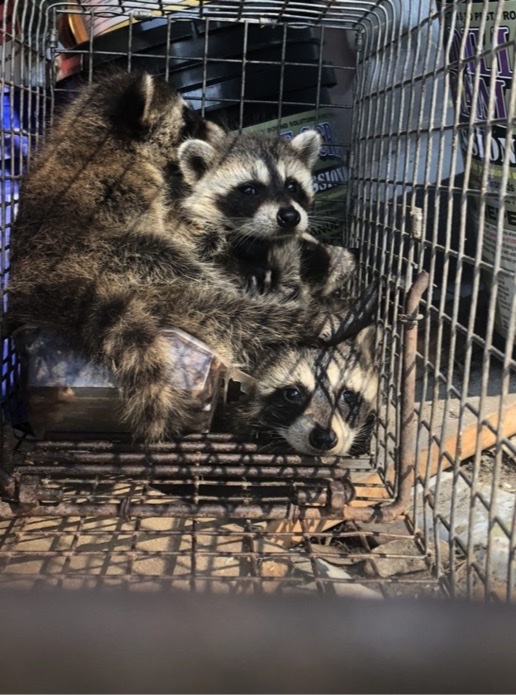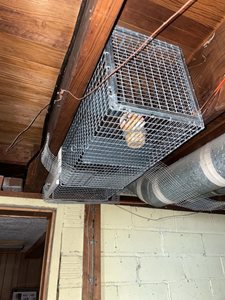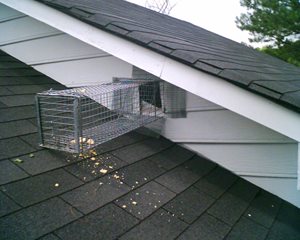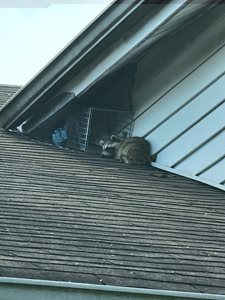If you’ve had your trash can raided, seen footprints around your property, and heard loud, strange noises on your roof or attic at night, you might need a raccoon trapping service.
Since raccoons are nocturnal, you might notice signs of raccoon activity before you see one. Even so, given the damage and health risks of having raccoons build their den in your attic, the signs are vital to act upon. Raccoons are a rabies vector species, meaning they are one of the most common animals in North America to carry and potentially spread rabies. They are also quite destructive. They can easily tear a hole in your roof to enter your attic. Once inside, they’ll tear insulation, gnaw beams and wires, and build a latrine for their feces and urine.
It may be tempting to try to trap a raccoon yourself. However, how to trap a raccoon should not be on any homeowner’s to-do list. The legalities and risks are too great. Critter Control experts have extensive experience trapping raccoons. Raccoon trapping is one of the services they provide most often.

Need Help with Raccoon Infestation?
Find a Critter Control near you.
Who Needs Raccoon Trapping Service?
Raccoons are opportunistic creatures who are not afraid to live among people in urban, suburban, or rural settings. It does not matter where you live or whether you own a home or commercial building; raccoons can create a costly problem when they build their den in your attic, basement, chimney, or walls. Raccoon removal by Critter Control is the long-term solution you need to preserve the value of your property and keep humans and pets healthy.
Signs of Raccoons
Raccoons are strong, agile animals, and the signs they leave are not subtle. If you have raccoons on your property or in your home, you will experience one or more of these signs:
- Loud noises coming from your attic, roof, or basement
- Footprints around the property
- Raided trash cans, bird feeders, and outdoor pet food
- Holes in your roof
- Claw marks on trees, shingles, and downspouts
Dangers of Raccoons
A raccoon infestation is destructive and costly to property. It also poses a health risk to you, your family, pets, and customers. Some of the dangers of trapping raccoons yourself and being exposed to them include:
- Exposure to rabies as raccoons are one of the most common carriers of rabies
- Exposure to other diseases, such as leptospirosis, giardiasis, and salmonella
- Parasitic exposure to raccoon roundworm and roundworm larvae
- Torn and soiled insulation
- Gnawed beams and wires
- A buildup of feces and urine from their latrine
How Critter Control Traps Raccoons
The best way to get rid of a raccoon is a cage trap. At Critter Control, we begin with an inspection both inside and outside of your home. The inspection will reveal where within your home the raccoons are denning, if they have kits, and where on your property they travel.
This information tells us how many traps to use and where to place them.
Critter Control has over 40 years of experience in raccoon removal. We’ve perfected humane, safe, and environmentally friendly methods for trapping raccoons.
Setting Raccoon Traps
We typically set up multiple traps at locations along the raccoons’ path. Our raccoon removal service uses only humane practices when trapping and legally rehoming raccoons. The raccoon trap is secured to protect the animal, especially if it is placed on the roof. If the trap is outside or on the roof, we typically cover it to protect the animal from the elements. The trap must be checked on often to prevent the raccoon from suffering from stress or exposure to weather conditions.
Raccoon Bait
Raccoons are opportunistic eaters with a healthy appetite. We bait the traps with sweets that raccoons are known to like, such as cherries, grapes, or marshmallows. These sweet items reduce non-target captures.
Critter Control Raccoon Traps



Sometimes, when there is only one raccoon with no kits involved, there are circumstances in which we install a raccoon excluder instead of traps. The excluder is installed at the raccoon’s entry point. It allows the raccoon to leave but prevents its return.
Contact Critter Control Today
Contact us today at 1-800-CRITTER to tell us about the raccoon that’s outlived its welcome at your house. We’ve been a leader in protecting property and people since 1983.
Get them out.
Keep them out.®
Experiencing a wildlife or pest issue? We can help! Complete this form and your local Critter Control® office will contact you to assist.
- How to Get Rid of Raccoons
- Are Raccoons Dangerous?
- Raccoon Control
- Baby Raccoons
- Dead Raccoon Removal
- Raccoon Diseases
- Do Raccoons Hibernate in Winter?
- Raccoon Damage
- Raccoon Diet
- Raccoon Poop
- Raccoons In Yards
- Raccoons in Basements
- Raccoons in Chimneys
- Raccoons in Crawl Spaces
- Raccoons in Houses
- Raccoons in Trash
- Raccoons in Trees
- Raccoons in Walls
- Raccoons on Roofs & in Soffits
- Raccoon Sounds
- Raccoon Tracks
- Raccoons in Attics & Ceilings
- What Does a Raccoon Look Like?